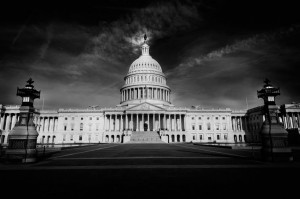MisDEMeanor: When It Comes to Legislators and Civil Disobedience, Why Is It Only the Dems?

Three democratic representatives walk into a jail.
No, that’s not the set-up for a joke. It’s something that happened recently in New York, when US Reps. Adriano Espaillat (D-NY), Luis Gutiérrez (D-IL) and Raúl Grijalva (D-AZ) were arrested outside Trump Tower during a protest against the president’s actions regarding the Deferred Action for Childhood Arrivals (DACA) policy.
As it turns out, they’re in good company. Democratic lawmakers collectively have quite an extensive rap sheet when it comes to protest arrests, with contributions coming from city councilors all the way up to members of the House. The Democrat’s cleanup hitter, as it were, is none other than Rep. John Lewis, (D-GA), who has been arrested while protesting five times since becoming a member of Congress. In his case, these arrests make sense—he’s been arrested forty other times over a long career of front-line activism, so it would be foolish to assume that a new title would make him change his ways. But what of the many other lawmakers who have embraced civil disobedience? What prompted their adoption of these tactics? And the central question to be explored here, evident after even a cursory examination of the evidence: why are they all Democrats?
Let’s take a swing at a few possible answers. Perhaps the explanation lies in the gridlock we see on Capitol Hill. Maybe once they’re elected, Democratic politicians feel that they can be more effective out in the streets than trying to push legislation through a Republican-controlled Congress. And yet in 2009, when John Lewis and four other Democratic representatives were arrested while protesting outside the Sudanese embassy in Washington, DC, Democrats controlled both houses of Congress and the presidency.
So is it about campaign optics, the charge House Speaker Paul Ryan (R-WI) made when democrats, led by Katherine Clark (D-MA) and MVP of this article, John Lewis, staged a sit-in on the House floor to agitate for a vote on gun control measures? If so, then why have Republican legislators not adopted similar tactics? Is the GOP, as the popular imagination might have one believe, too proper to involve themselves in the tactics of the proletariat?
Or could it be that Republican lawmakers are less likely to be involved in civil disobedience because their constituents tend to be more rural, making it more difficult for them to mobilize and unite for collective action? Or that their constituents themselves are less likely to engage in public protests? Possibly. However, while Democratic lawmakers are often arrested during protests that were organized by constituents or other groups, they are not, as the House sit-in demonstrated, afraid to plan their own civil disobedience, something Republican legislators could do regardless of the demographics and geography of their base.
Ultimately, the question of why Democratic, but not Republican, lawmakers allow themselves to be arrested during civil disobedience actions may be best answered by considering the fact that they are being arrested while protesting for actions that challenge the status quo, something that conservatives, by definition, are loathe to do. Democratic lawmakers, on the other hand, have been arrested protesting state violence in Ferguson, Missouri, inaction on a humanitarian crisis in Darfur, and for immigrants’ rights. Recently, several, including the three mentioned at the beginning of the article, have been arrested at DACA-related protests (one could argue that this is not challenging the status quo, since DACA was, until recently, law, but I would contend that given the oft-persecuted group which DACA most significantly affects; the history, as mentioned, of democratic protest in favor of immigration and the rights of immigrants; and the current Republican domination of the legal institutions for addressing this issue, these protests are in fact continuations of Democrats’ long, status-quo-challenging fight to grant greater protection to vulnerable populations). Protest has historically been the domain of the numerical minority and the oppressed, and in the arrests of democratic legislators, we see a dedication to amplifying the voices and needs of these communities.
Republicans love to present themselves as staunch defenders of the First Amendment, but often seem to forget that the right to “peaceably to assemble” is included within. As we see Republican legislators in many states introduce bills attempting to crack down on protests and the rights of protestors (to say nothing of our Republican president’s wish to silence NFL football players), Democratic lawmakers are vigorously exercising their rights to participate in acts of civil disobedience, which begs the question: Who’s right about civil rights?
